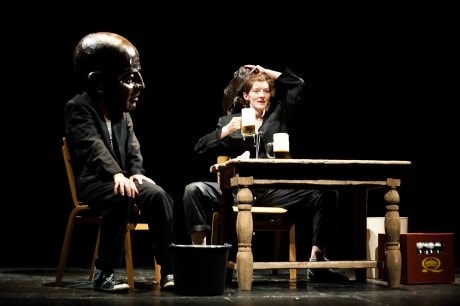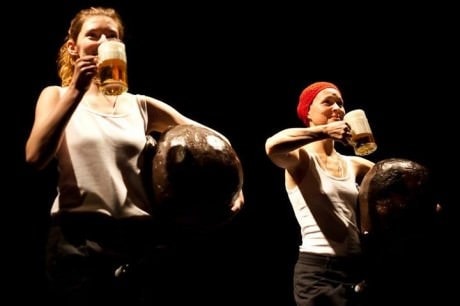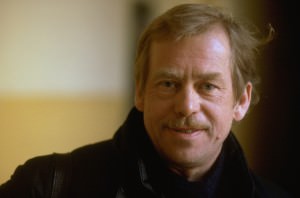Antiwords inspired by Václav Havel’s ‘Audience’

Havel’s ultimate goal as a playwright was to appeal to his spectators, to provoke them into self-reflection and encourage them to change. His main concern was for human identity and its survival in the oppressive environment, including the globalized modern world. “Will the Czech actresses outdo the legend? Will they reach a state on the edge, recalling Havel’s motif of alienation?” These are some of the questions which had been asked about the performance by the theatre critics and educated enthusiasts of Havel’s works. What about an average American theatre goer with rudimentary knowledge of the Czech playwright’s legacy and a minimal awareness of what it is like to live in an oppressive state? What would Antiwords, based on Václav Havel’s play Audience, tell them about the author and his culture, how would the performance connect with them and their 21st century context?
Last Saturday, September 21, 2013, at the opening of Antiwords, presented by the Ambassador Theatre in partnership with the Embassy of the Czech Republic and the 2013 Mutual Inspirations Festival, I had my American friends sitting to my left and the Eastern European ones on the right and was eagerly awaiting their reactions and impressions. What If Havel himself was in the audience, I thought? What would he feel and say?
Several minutes into the play I was sure that Havel would laugh, as we all did during the opening scene reminiscent of the communist ‘mise en scene.’ Imagine two identically dressed and drearily looking actresses slowly walking onto the almost bare stage, carrying oversized paper mache heads under one arm and shopping bags containing beer bottles and jugs under the other. The laughter erupts when Čechová and Krivankova, facing the audience, place the beer bottles between their upper thighs and leave them protruding, open them with beer openers hanging from their necks latch- key style, and start pouring the beer into jugs using gentle but suggestive pelvis thrusts. What do we think we are looking at? The association is instant – two drunks urinating in public; image slightly shocking, but unexpectedly funny. Mind you, we had been warned. The director’s Peter Bohac warning had been read out to us before the performance – “If you have anything against drinking, leave now”.
The laughter continues when the oversized heads and men’s jackets transform the female actresses into the characters from Audience – Vanek and the Foreman. Audience, written in 1975 belongs to The Vanek Trilogy, three partly autobiographical absurdist plays bound by a character of Havel’s alter-ego Ferdinand Vanek, a dissident writer and intellectual. In Audience, Vanek, just like Havel in real life, is forced to work at a brewery, rolling barrels. The absurd starts when his boss, the brew master who earns brownie points with authorities by reporting on his dissident subordinates, calls him into his office and offers him a better job in return for inventing and admitting to political activities. At the end of a long and repetitive verbal exchange driven by the foreman who keeps knocking down beers like lemonade and forcing his reluctant subordinate to drink with him, Vanek, despite his apparent timidity, refuses to participate in “something I have always found repugnant” and asserts his identity and values despite all odds.

Miřenka Čechová and Sivan Eldar from the Spitfire Company, the creators of Antiwords, courageously abandoned the play’s dialog and conventional acting and successfully transformed the play into a physical spectacle with the help of music, dance, movement and grotesque props, not to mention beer drinking, an ingrained element of Czech culture, society and history. Drawing on Havel’s love of the absurd and the visual and his dependence on humor as an indispensable tool of survival, they created a challenging and entertaining version of the conversation between the oppressor and the oppressed. Displaying only a few carefully selected fragments of the play’s dialog on the screen the directors decided to place their trust into the actors’ bodies and the oversized heads to convey the emotions, messages, moods and behaviors of the characters and the situations. The effect is brilliant. The highly skilled actors alternate between the characters, and although looking identical, are able to transform instantly as if by magic. In Antiwords, words are spurious; movement and dance combined with music or silence are sufficient to entertain and provoke the audience to react – even those only slightly familiar with the spectacle’s background and context.
The power of Antiwords and its ability to connect with modern audiences lies in its radical approach and emphasis on the absurd. The spectacle’s absurdist character highly exceeds Havel’s original, by transforming the conversation between Vanek and the brew master into a de-personalized and universal story of two individuals forced to communicate but unable to find a common ground. By masking the protagonists and making them unrecognizable, Čechová and Eldar make the characters neutral and relatable. The broken, highly repetitive and irrational ‘dialog’ is reminiscent of theatre of the absurd and its post-modernist existential themes of alienation and disappointment, so relevant today. The audience reacts with laughter to the elements of the grotesque and satire, yet those I had spoken with, leave the theatre disturbed by having recognized themselves in the puppet looking characters, devoiced and disconnected from reality and their true selves. Some with the knowledge or/and experience of life in a communist Europe, including myself, are triggered into feeling bitter-sweet nostalgia and sadness magnified by the somber tunes played at the end of the performance to emphasize the importance of the spectacle’s and its inspirational play’s message.
The audience leaves challenged and entertained – exactly like Havel would have wanted. His Audience played its role at the time when it was most needed. It kept reminding Czech people of the evil of communism and encouraged them to overcome fear and to resist de-humanization. Antiwords continue and honor Havel’s legacy in a true absurdist fashion by warning us against losing life’s true meaning, donning a mask and compromising our true identities and dreams in exchange for mixed blessings of the globalized world.

Congratulations to the creators and actors of Antiwords for presenting a unique, powerful and highly recommended performance, and hats off to Ambassador Theatre and their International Artists Series for bringing the Spitfire Company and their production to DC and presenting American audiences with the opportunity to experience world class theatre.
____
Eliza Anna Falk graduated from Sydney and Warsaw Universities, recently with a M.A. in British Cultural Studies, as well as with Cambridge CELTA. She writes and translates poetry and is an avid theatre goer, recently writing background papers on two Eastern European playwrights, Ireneusz Iredynski and Vaclav Havel.

The Václav Havel plays tonight – Tuesday, September 24th and tomorrow – Wednesday, September 25, 2013 at 8 pm at Atlas Performing Arts Center – 1333 H Street NE, in Washington, DC. For tickets, call the box office (202) 399-7993, or purchase them online.
LINKS
Backstage in Preparation for ‘The Václav Havel Project’ by Susan Galbraith.
Ambassador Theater website.




